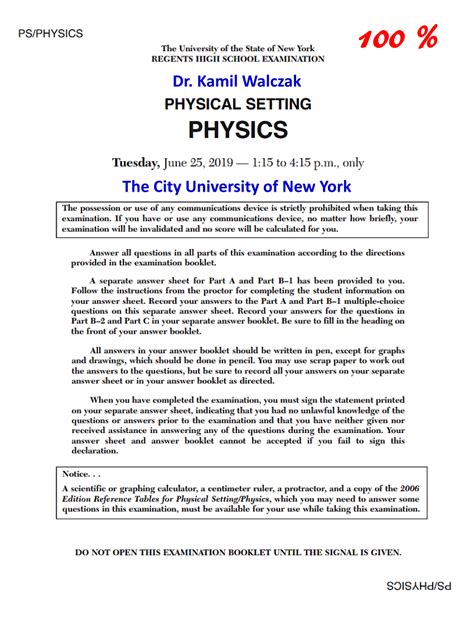The New York State Physics Regents Exam is a standardized assessment taken by high school students in New York to demonstrate their understanding of physics concepts. Passing this exam is crucial for students seeking a higher education in science, engineering, or related fields. To help you prepare effectively, this article provides a detailed overview of the exam, including its format, topics covered, and strategies to maximize your performance.

Exam Format
The NYS Physics Regents Exam consists of three parts, each designed to evaluate different aspects of physics knowledge and skills:
Part A: 30 multiple-choice questions (50% of total grade)
Part B: 14 short-answer questions (30% of total grade)
Part C: 4 open-ended questions (20% of total grade)
Topics Covered
The exam covers a broad range of physics concepts, organized into several units:
- Motion and Forces
- Energy and Momentum
- Electricity and Magnetism
- Waves and Optics
- Modern Physics
Each unit is further divided into specific topics, such as kinematics, dynamics, thermodynamics, circuits, wave properties, and nuclear reactions.
Preparation Strategies
1. Study the Course Material Thoroughly:
Familiarize yourself with the physics concepts covered in class and in the NYS Physics Reference Tables. Use textbooks, online resources, and practice problems to enhance your understanding.
2. Practice with Multiple-Choice Questions:
Solve as many multiple-choice questions as possible to develop your problem-solving and analytical skills. Utilize online question banks, practice exams, and past papers to test your knowledge.
3. Master Short-Answer Questions:
Short-answer questions require concise and accurate responses. Practice writing clear and well-reasoned answers that demonstrate your grasp of physics principles.
4. Develop Open-Ended Problem-Solving Abilities:
Open-ended questions involve complex problem-solving and application of physics concepts to real-world scenarios. Practice analyzing problems, identifying relevant equations, and presenting logical solutions.
5. Utilize the NYS Physics Reference Tables:
The exam provides a set of reference tables containing essential formulas, constants, and data. Study these tables thoroughly and become familiar with their use in solving problems.
Additional Resources
- NYS Education Department: Physics Regents Exam
- College Board: AP Physics C
- Khan Academy: Physics
- The Physics Classroom
Tips for Success
- Start preparing early: Begin studying well in advance to avoid cramming.
- Set realistic study goals: Break down the material into manageable chunks and set achievable targets.
- Attend review sessions: Utilize available review sessions to clarify concepts and ask questions.
- Join study groups: Collaborating with peers can enhance understanding and motivation.
- Take mock exams: Simulate exam conditions to practice time management and identify areas for improvement.
- Manage your time wisely: Allocate sufficient time to each question and avoid spending too much time on any single question.
- Read instructions carefully: Ensure you understand the requirements of each question before attempting it.
- Show your work: Even for multiple-choice questions, show your work to demonstrate your reasoning process.
- Be positive and confident: Approach the exam with a positive mindset and believe in your abilities.
Conclusion
The NYS Physics Regents Exam is a challenging but rewarding assessment that tests students’ understanding of physics concepts and their ability to apply them to real-world problems. By following the strategies outlined in this article, you can maximize your performance and achieve your desired score. Remember to stay organized, study diligently, and remain confident throughout the preparation and exam process.
FAQs
1. What is the passing score for the NYS Physics Regents Exam?
The passing score varies from year to year, but it is typically around 65%.
2. How long is the NYS Physics Regents Exam?
The exam is 3 hours and 15 minutes long.
3. What is the best way to prepare for the NYS Physics Regents Exam?
The best way to prepare is to study the course material thoroughly, practice with multiple-choice and short-answer questions, and develop open-ended problem-solving abilities.
4. What are some common mistakes to avoid on the NYS Physics Regents Exam?
Common mistakes include neglecting units, misinterpreting question requirements, and not showing your work on multiple-choice questions.
5. What should I do if I don’t understand a concept on the NYS Physics Regents Exam?
Ask your teacher for clarification, join a study group, or consult online resources.
